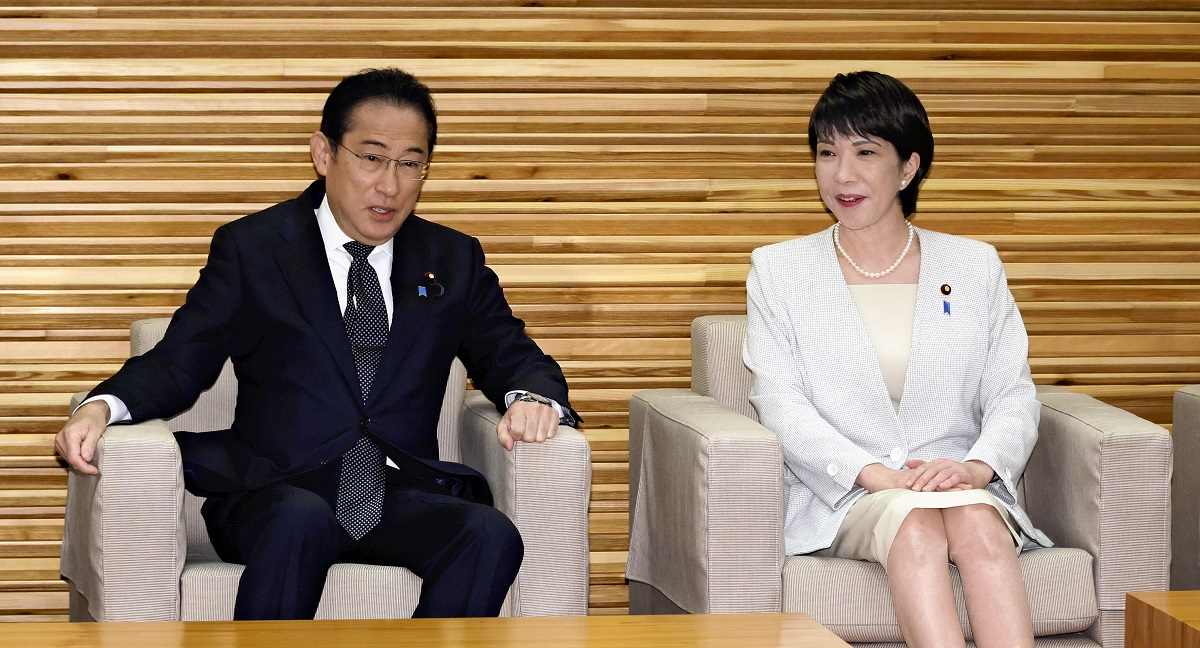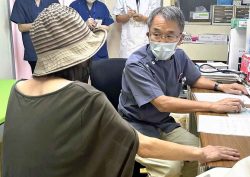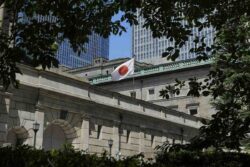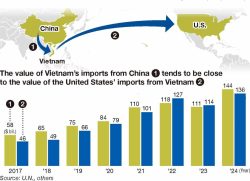New Law for Boosting Japan’s Economic Security to Enhance International Collaboration; Impacts on Personnel to be Considered

Prime Minister Fumio Kishida, left, and Sanae Takaichi, minister in charge of economic security, attend a cabinet meeting at the Prime Minister’s Office on Friday.
16:12 JST, May 11, 2024
With the passage of a new law on Friday, the government will adopt a “security clearance system,” under which those who can handle key information in the field of economic security are to be certified by the government.
With China in mind, the government intends to create an information protection system on par with those in Western countries, thus supporting Japanese firms as they conduct international business.
Catching up with other countries
“With the new law, Japan will be able to gain the confidence of allies and like-minded countries as it has an information protection system on the same caliber as those countries, which will help to increase opportunities for Japanese private business operators to take part in international research and similar activities,” said Sanae Takaichi, minister in charge of economic security, at a press conference held before a plenary session of the House of Councillors on Friday.
As countries in North America and Europe have already established systems for protecting key information, including economic security secrets, Japan is lagging behind them.
The Law on the Protection of Specially Designated Secrets, which went into effect in 2014, is designed to protect information that is required to be kept secret due to the risk of causing “severe damage” to Japan’s national security if disclosed without authorization.
The “important economic security information” to be designated under the new “law on the protection and utilization of important economic security information” covers secrets that may cause “damage” to national security.
Deciding the designation status of important economic security information will be done by each of the central government administrative organ, with the Cabinet Office to confirm whether such actions are appropriate or not.
The Cabinet Office’s Independent Public Records Management Secretary will also inspect and supervise the designation of such information, through which, the government says, a “multilayered checking system” will be put in place.
Reducing risk
At the Diet deliberation, Takaichi cited the following types of information to be covered under the new law as: (1) those concerning cyber-attacks on “key infrastructure,” including electricity and gas, and the government’s response measures; and (2) those related to foreign governments’ information on international joint research on critical materials, including semiconductors and storage batteries.
China, Russia, and some other countries have reportedly been targeting Japan’s infrastructure through cyber-attacks in an attempt to disrupt society.
The government intends to promote information sharing between the public and private sectors under the new system, thus strengthening countermeasures against such attacks.
The government also plans to push forward technical cooperation with Western countries to achieve “risk reduction” by reducing dependence on China for the supply of critical goods and technologies.
The government aims to put the system into operation by May next year. To do so, it will quickly convene an expert panel to formulate operational standards, including details on the information to be covered.
Impacts on personnel
Those government and private-sector officials qualified to perform the duty of handling important economic security information will be subject to background checks on seven matters, including their family, criminal records, and drug abuse. The screening will be performed by a centralized inquiry organ to be set up within the Cabinet Office.
Clearance will be granted to officials by each central government administrative organ based on the results of the screening. The number of people with clearance is expected to total several thousand. The inquiry organ is expected to start with a few dozen officials, and will be expanded gradually.
During the Diet deliberation, concerns were raised that if a person subject to screening refuses to undergo it or is found to be unqualified, they may be subject to setbacks, such as unreasonable reassignment within the company.
The new law prohibits such acts, and the government will provide specific examples of prohibited cases in its operational standards.
"Politics" POPULAR ARTICLE
-

Japan, India Aim for More Than 500,000 People-to People Exchanges over Next 5 Years
-

Japan to Provide ¥810 Billion in Infrastructure Aid to African Nations, Seeks to Reduce China’s Influence in Continent
-

Chief of Japan’s SDF Logistics Unit in Djibouti Vows to Assist Japanese Nationals in Emergencies, Stresses Need to Prepare for Protecting Citizens
-

Japan-South Korea Agreement Reflects Shared Understanding
-

Remote Japan Island near Taiwan Struggles to Secure Doctor Amid Fear of Taiwan Contingency
JN ACCESS RANKING
-

Japan’s Seafood Exports Still Hurting in Wake of Fukushima Incident, but Hopes Rising for Chinese Market
-

Japan’s Core Inflation Slows in July, Stays above BOJ Target
-

Japan in Prime Spot for Total Lunar Eclipse Early Monday Morning, 1st Visible from Country in Almost 3 Years
-

Japan, India Aim for More Than 500,000 People-to People Exchanges over Next 5 Years
-

S. Korea’s Lee Eager to Enhance Ties with Japan More






















